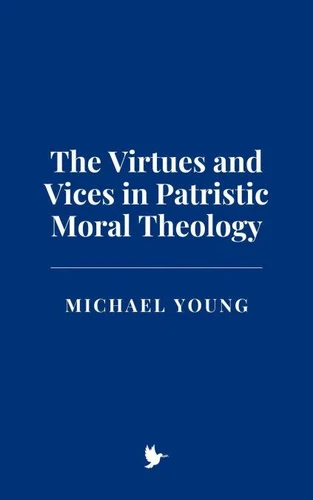The Virtues and Vices in Patristic Moral Theology
Par :Formats :
Disponible dans votre compte client Decitre ou Furet du Nord dès validation de votre commande. Le format ePub est :
- Compatible avec une lecture sur My Vivlio (smartphone, tablette, ordinateur)
- Compatible avec une lecture sur liseuses Vivlio
- Pour les liseuses autres que Vivlio, vous devez utiliser le logiciel Adobe Digital Edition. Non compatible avec la lecture sur les liseuses Kindle, Remarkable et Sony
 , qui est-ce ?
, qui est-ce ?Notre partenaire de plateforme de lecture numérique où vous retrouverez l'ensemble de vos ebooks gratuitement
Pour en savoir plus sur nos ebooks, consultez notre aide en ligne ici
- FormatePub
- ISBN8230994022
- EAN9798230994022
- Date de parution18/02/2025
- Protection num.pas de protection
- Infos supplémentairesepub
- ÉditeurIndependently Published
Résumé
The early Christian understanding of virtue was deeply shaped by the synthesis of biblical teachings, Jewish moral traditions, and the philosophical legacy of the Greco-Roman world. In the Patristic period, virtue was not merely an abstract ethical concept but an essential part of the Christian life, a means by which believers conformed themselves to the image of Christ. The Church Fathers saw virtue as both a divine gift and a human task, requiring both grace and effort.
Their reflections on virtue were rooted in the New Testament, particularly in the teachings of Jesus and the writings of St. Paul, and were further developed in response to the moral challenges facing the growing Christian communities. One of the earliest formulations of Christian virtue can be found in the Didache, a first-century Christian text that presents a simple yet profound ethical dichotomy: the Way of Life and the Way of Death.
The Way of Life is characterized by virtues such as love, humility, and patience, while the Way of Death is marked by vices such as greed, pride, and deceit. This dualistic moral vision, echoing the ethical teachings of the Hebrew Scriptures, underscores the importance of virtue as the distinguishing mark of a true Christian. The Didache's practical moral instruction, including directives on charity, fasting, and interpersonal relationships, reflects the early Church's concern with virtue as an embodied reality, lived out in daily life rather than as a theoretical ideal.
Their reflections on virtue were rooted in the New Testament, particularly in the teachings of Jesus and the writings of St. Paul, and were further developed in response to the moral challenges facing the growing Christian communities. One of the earliest formulations of Christian virtue can be found in the Didache, a first-century Christian text that presents a simple yet profound ethical dichotomy: the Way of Life and the Way of Death.
The Way of Life is characterized by virtues such as love, humility, and patience, while the Way of Death is marked by vices such as greed, pride, and deceit. This dualistic moral vision, echoing the ethical teachings of the Hebrew Scriptures, underscores the importance of virtue as the distinguishing mark of a true Christian. The Didache's practical moral instruction, including directives on charity, fasting, and interpersonal relationships, reflects the early Church's concern with virtue as an embodied reality, lived out in daily life rather than as a theoretical ideal.
The early Christian understanding of virtue was deeply shaped by the synthesis of biblical teachings, Jewish moral traditions, and the philosophical legacy of the Greco-Roman world. In the Patristic period, virtue was not merely an abstract ethical concept but an essential part of the Christian life, a means by which believers conformed themselves to the image of Christ. The Church Fathers saw virtue as both a divine gift and a human task, requiring both grace and effort.
Their reflections on virtue were rooted in the New Testament, particularly in the teachings of Jesus and the writings of St. Paul, and were further developed in response to the moral challenges facing the growing Christian communities. One of the earliest formulations of Christian virtue can be found in the Didache, a first-century Christian text that presents a simple yet profound ethical dichotomy: the Way of Life and the Way of Death.
The Way of Life is characterized by virtues such as love, humility, and patience, while the Way of Death is marked by vices such as greed, pride, and deceit. This dualistic moral vision, echoing the ethical teachings of the Hebrew Scriptures, underscores the importance of virtue as the distinguishing mark of a true Christian. The Didache's practical moral instruction, including directives on charity, fasting, and interpersonal relationships, reflects the early Church's concern with virtue as an embodied reality, lived out in daily life rather than as a theoretical ideal.
Their reflections on virtue were rooted in the New Testament, particularly in the teachings of Jesus and the writings of St. Paul, and were further developed in response to the moral challenges facing the growing Christian communities. One of the earliest formulations of Christian virtue can be found in the Didache, a first-century Christian text that presents a simple yet profound ethical dichotomy: the Way of Life and the Way of Death.
The Way of Life is characterized by virtues such as love, humility, and patience, while the Way of Death is marked by vices such as greed, pride, and deceit. This dualistic moral vision, echoing the ethical teachings of the Hebrew Scriptures, underscores the importance of virtue as the distinguishing mark of a true Christian. The Didache's practical moral instruction, including directives on charity, fasting, and interpersonal relationships, reflects the early Church's concern with virtue as an embodied reality, lived out in daily life rather than as a theoretical ideal.























